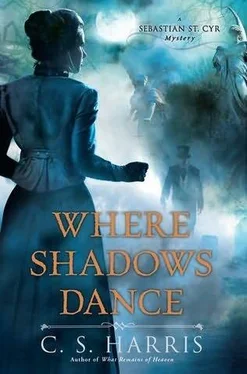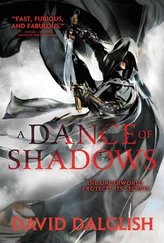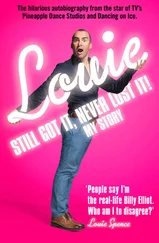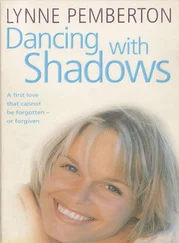“You don’t think Ross’s weakness for dark-eyed, exotic women might be a reason for the Foreign Office to quietly dispose of him?”
De La Rocque pursed his lips and tilted his head, as if considering this as a new possibility. “Perhaps.”
“I can think of another reason,” said Sebastian.
“Oh?”
“If Yasmina’s lover from the Foreign Office was not in truth Ross but someone else—say, Sir Hyde himself—and Ross found out about it, I can see Sir Hyde killing Ross to keep his indiscretion quiet.”
“Ridiculous. Sir Hyde has a most beautiful young wife. Have you not seen her?”
“Since when did the possession of a beautiful wife keep a man from straying? Ross was betrothed to a beautiful young woman himself, remember?”
“Betrothed. Not wed,” said de La Rocque with a sly smile. “It makes a difference. Does it not, Monsieur le Vicomte?”
“To some men. Not to others.”
“And which sort of man was Alexander Ross? Hmm? Perhaps that is the question you need to answer before all others.”
Sebastian stood on the flagway of Great Russell Street, his eyes narrowed against the glare of the hot sun. What sort of man was Alexander Ross, really? He had spent the better part of three days trying to find the answer to that question, yet he still felt as if the truth were eluding him.
Alexander Ross was either a warmhearted, generous man, honorable, decent, and kind, or he was a weak, self-indulgent traitor who had betrayed both his country and the woman he loved. He couldn’t be both.
Unfortunately, it would be difficult to either confirm or disprove the allegations against the Turkish Ambassador and his lady. One could not, after all, simply come right out and ask an ambassador if the woman he claimed as his wife was in truth a beautiful courtesan sent by his government to seduce the powerful men of his host country. Nor was a blunt question directed to the likes of Sir Hyde Foley likely to elicit an honest response.
Sebastian could think of only one person who might—just might—both know the truth and be willing to talk about it. It was not exactly the type of thing a man normally discussed with his gently bred future wife. But then, Miss Hero Jarvis was an unusual gentlewoman.
He stepped off the flagway and went in search of his betrothed.
Hero spent the early hours of the afternoon in Duke’s Place, in that part of London known as Aldgate.
Once, a century ago, Duke’s Place had been a fashionable address. But as the cream of London society moved steadily westward, the place had grown increasingly seedy. Now the open square was crowded with rickety market stalls thronged by pale, gaunt-faced women in ragged shawls and tattered skirts; the once-grand houses overlooking the market had long since fallen into a state of disrepair. Hero was careful to keep her carriage—and two stout, wooden-faced footmen—nearby, the high-bred team of blood bays sidling restlessly and flinging up their heads at every ragged urchin who ventured too close. Her abigail stood at her elbow, nervously clutching Hero’s sketchbooks, drawing implements, and parasol.
Hero herself had her hands full, with a notebook tucked under one arm and a large folio of maps balanced against her hip. She was studying a bricked-up, arched doorway in an old stone wall when a man’s shadow fell across her. Looking up, she found Lord Devlin studying her with an indecipherable expression on his lean, handsome face.
“Devlin,” she said in surprise. “Whatever are you doing here?”
“Looking for you.” He transferred his gaze to the wall beside her. “What exactly are you peering at with such fascination?”
“It’s my belief that Duke’s Place follows exactly the outline of the cloisters of the old Holy Trinity Priory, pulled down after the dissolution of the monasteries under Henry the Eighth.” She gestured toward the ancient stonework beside them. “Look at this. I think it may once have been the entrance to the original chapter house.”
He looked instead at her. “I didn’t know you were interested in this sort of thing.”
She handed the maps to her maid and retrieved her parasol. “Dr. Littleton is compiling a volume on the surviving remnants of medieval London, and I’ve offered to contribute a section on the traces of the city’s monastic houses. I’m finding it fascinating. It is astonishing how much is still here, if one only knows where to look. Unfortunately, it is disappearing far too quickly.”
His strange amber eyes narrowed with amusement. “And here I thought you an advocate of modern science and technology.”
“I am excited by the possibilities inherent in today’s scientific advances, yes. But I also believe it is important to preserve the memories and relics of the past.” They turned to walk along the edge of the square, away from the squalid racket of the market. “There must be things you’re passionate about—besides the usual male fascination with guns, horses, hounds, and wine.”
He laughed. “I do enjoy poetry and music. Does that redeem me? And the theater,” he added, then looked as if he wished he hadn’t.
She decided that under the circumstance it was probably best to ignore that. “And murder,” she said. “You enjoy murder.”
“I would hardly say I enjoy it. But I am passionate about seeing justice done, yes.”
“And are you any closer to finding justice for Alexander Ross?”
His lips compressed to a tight, frustrated line. She was beginning to realize just how much of himself this man invested in what he was doing. “I don’t feel as if I am,” he said. “I know more about Ross’s activities in the days before his death, but that is all.”
They entered a narrow, shadowy passage that led toward the looming bulk of the church of St. James. It was cool here, the ancient stones filling the space with a dank closeness. Behind them, Hero’s abigail shivered.
Hero said, “So what precisely was Ross doing in his last days?”
“Well, on Wednesday he met with a certain defrocked French priest with a passion for old books.”
“You mean, Antoine de La Rocque?”
“You know him?”
She nodded. “He’s a regular at the salons of the city’s bluestockings, particularly Miss Hershey and the Misses Berry.”
He opened his eyes wide, as if in astonishment. “Are you?”
She gave a soft laugh. “I wouldn’t describe myself as a ‘regular.’ But I do sometimes attend, yes. Who told you about de La Rocque?”
“The owner of the Je Reviens coffeehouse.”
“Ah, Angelina Champagne.”
“Don’t tell me you know her, as well?”
“She also attends the salons of Miss Hershey and the Misses Berry—although not, of course, in the company of de La Rocque.”
He said, “Yes, I had the distinct impression Madame Champagne is not excessively fond of de La Rocque.”
“One could say that.”
“Do you know why?”
“Possibly because he’s such a ridiculously affected person. Although I suspect there’s more to it than that. I think she may have known him before, in Paris.”
“I understand her husband was Baron Champagne.”
Hero nodded. “He was killed in the September Massacres of 1792.” She kept her gaze on the ancient, soot-stained tower of the church before them. “They were imprisoned in La Force, with the Princess de Lamballe. The mobs broke in and dragged them out into the courtyard. Champagne was killed before his wife’s eyes, while she herself was ... used harshly by the men. She lost her eye as a result of the beatings and abuse she endured.”
Devlin was silent for a moment. Then he said, “What happened to her after that?”
“When they realized she was still alive, they threw her back in prison. She kept expecting to be sent to the guillotine, but they never came for her. She was released after something like four years.”
Читать дальше












